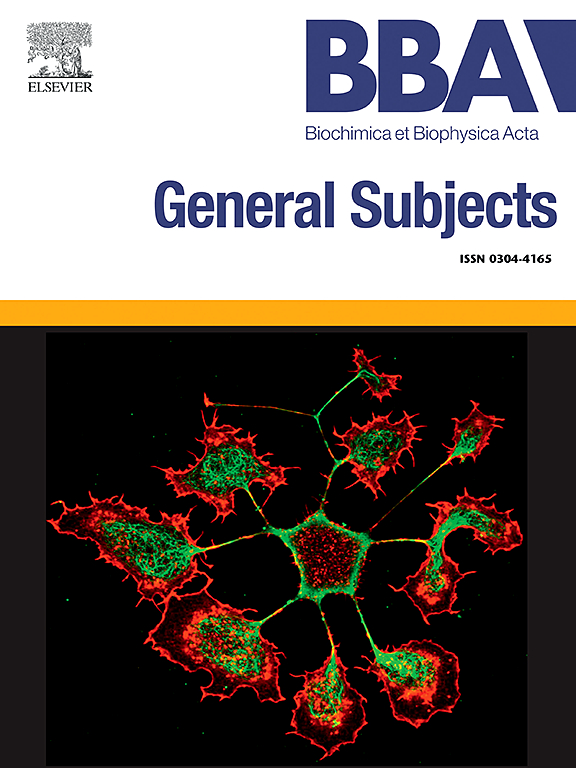USP3通过稳定MYC和促进糖酵解促进透明细胞肾细胞癌的进展
IF 2.2
3区 生物学
Q3 BIOCHEMISTRY & MOLECULAR BIOLOGY
Biochimica et biophysica acta. General subjects
Pub Date : 2025-03-29
DOI:10.1016/j.bbagen.2025.130801
引用次数: 0
摘要
透明细胞肾细胞癌(ccRCC)是最常见的肾恶性肿瘤类型,去泛素酶USP3在肿瘤生物学中被认为是一个关键因素。然而,USP3促进ccRCC进展的确切机制尚不清楚。本研究探讨了USP3在ccRCC中的作用并阐明了其潜在的分子机制。来自TCGA和GTEx数据库的数据显示,与正常肾组织相比,ccRCC组织和细胞系中USP3的表达升高。qPCR和Western blot进一步分析证实了ccRCC细胞系中这种上调。功能分析显示,沉默USP3可显著损害细胞增殖、迁移和侵袭,同时促进细胞凋亡。此外,共免疫沉淀试验表明USP3和MYC之间存在相互作用,随后的泛素化试验表明USP3调节MYC的稳定性。USP3缺失也导致糖酵解相关基因表达的改变,这可以通过MYC过表达部分逆转。这些发现表明USP3通过稳定MYC来调节ccRCC的进展,突出了其作为ccRCC治疗靶点的潜力。本文章由计算机程序翻译,如有差异,请以英文原文为准。
USP3 promotes clear cell renal cell carcinoma progression by stabilizing MYC and enhancing glycolysis
Clear cell renal cell carcinoma (ccRCC) is the most prevalent type of renal malignancy, and the deubiquitinase USP3 has been implicated as a critical factor in tumor biology. However, the precise mechanisms by which USP3 contributes to ccRCC progression remain unclear. This study investigates the role of USP3 in ccRCC and elucidates its underlying molecular mechanisms. Data from TCGA and GTEx databases showed elevated USP3 expression in ccRCC tissues and cell lines compared to normal renal tissues. Further analysis using qPCR and Western blot confirmed this upregulation in ccRCC cell lines. Functional assays revealed that silencing USP3 significantly impaired cell proliferation, migration, and invasion, while promoting apoptosis. Additionally, co-immunoprecipitation assays demonstrated an interaction between USP3 and MYC, with subsequent ubiquitination assays showing that USP3 regulates MYC stability. USP3 depletion also led to alterations in glycolysis-related gene expression, which could be partially reversed by MYC overexpression. These findings suggest that USP3 modulates ccRCC progression by stabilizing MYC, highlighting its potential as a therapeutic target in ccRCC treatment.
求助全文
通过发布文献求助,成功后即可免费获取论文全文。
去求助
来源期刊

Biochimica et biophysica acta. General subjects
生物-生化与分子生物学
CiteScore
6.40
自引率
0.00%
发文量
139
审稿时长
30 days
期刊介绍:
BBA General Subjects accepts for submission either original, hypothesis-driven studies or reviews covering subjects in biochemistry and biophysics that are considered to have general interest for a wide audience. Manuscripts with interdisciplinary approaches are especially encouraged.
 求助内容:
求助内容: 应助结果提醒方式:
应助结果提醒方式:


